Unit3 What can you see
幼儿园whatcanyousee教案
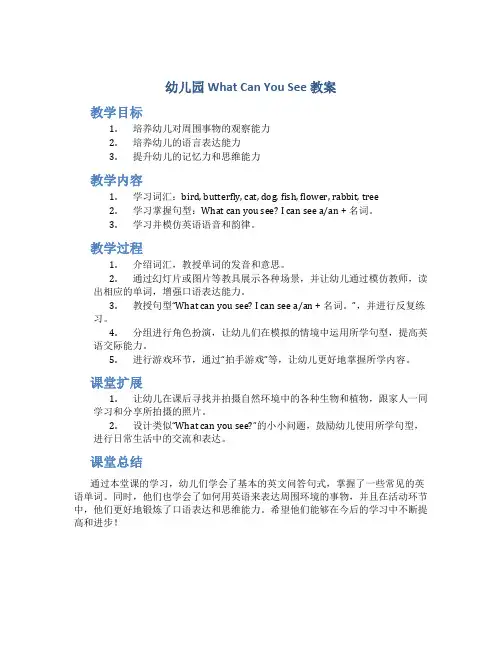
幼儿园 What Can You See 教案
教学目标
1.培养幼儿对周围事物的观察能力
2.培养幼儿的语言表达能力
3.提升幼儿的记忆力和思维能力
教学内容
1.学习词汇:bird, butterfly, cat, dog, fish, flower, rabbit, tree
2.学习掌握句型:What can you see? I can see a/an + 名词。
3.学习并模仿英语语音和韵律。
教学过程
1.介绍词汇,教授单词的发音和意思。
2.通过幻灯片或图片等教具展示各种场景,并让幼儿通过模仿教师,读
出相应的单词,增强口语表达能力。
3.教授句型“What can you see? I can see a/an + 名词。
”,并进行反复练
习。
4.分组进行角色扮演,让幼儿们在模拟的情境中运用所学句型,提高英
语交际能力。
5.进行游戏环节,通过“拍手游戏”等,让幼儿更好地掌握所学内容。
课堂扩展
1.让幼儿在课后寻找并拍摄自然环境中的各种生物和植物,跟家人一同
学习和分享所拍摄的照片。
2.设计类似“What can you see?”的小小问题,鼓励幼儿使用所学句型,
进行日常生活中的交流和表达。
课堂总结
通过本堂课的学习,幼儿们学会了基本的英文问答句式,掌握了一些常见的英语单词。
同时,他们也学会了如何用英语来表达周围环境的事物,并且在活动环节中,他们更好地锻炼了口语表达和思维能力。
希望他们能够在今后的学习中不断提高和进步!。
Unit3 What can you see
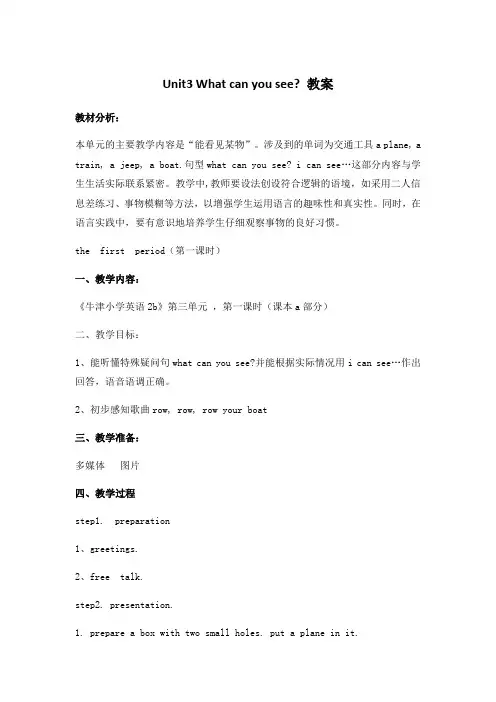
Unit3 What can you see? 教案教材分析:本单元的主要教学内容是“能看见某物”。
涉及到的单词为交通工具a plane, a train, a jeep, a boat.句型what can you see? i can see…这部分内容与学生生活实际联系紧密。
教学中,教师要设法创设符合逻辑的语境,如采用二人信息差练习、事物模糊等方法,以增强学生运用语言的趣味性和真实性。
同时,在语言实践中,要有意识地培养学生仔细观察事物的良好习惯。
the first period(第一课时)一、教学内容:《牛津小学英语2b》第三单元,第一课时(课本a部分)二、教学目标:1、能听懂特殊疑问句what can you see?并能根据实际情况用i can see…作出回答,语音语调正确。
2、初步感知歌曲row, row, row your boat三、教学准备:多媒体图片四、教学过程step1. preparation1、greetings.2、free talk.step2. presentation.1. prepare a box with two small holes. put a plane in it.t: boys and girls, i have a magic box. what’s in it? use your eyes and look carefully through this small hole. who’d like to try?t: what can you see?you can say ‘i can see…’s: i can see…t: let’s open the box. what can you see, children?ss: i can see a plane2. teach: plane3. read the sentences: what can you see? i can see….4. t: today we’ll learn ‘unit 3 what can you see?’5.learn the dialogue.①look at the picture and talk about it.②watch and listen .and repeat.③listen and repeat.④read in roles.step3. consolidation1. ask and answer( four animals: dog, cat, pig, duck.)2. listen and guess ( 听声音,猜人物)s1: what can you see? (背对大家)s2: i can see…s1: you are …3. magic eyesstep 4.homework1. listen and repeat the dialogue four times.。
英语1必修unit3练习及参考答案
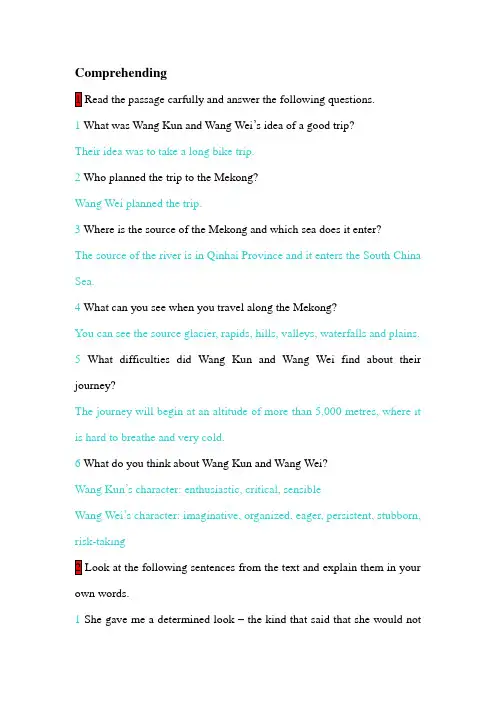
Comprehending1 What was Wang Kun and Wang Wei’s idea of a good trip?Their idea was to take a long bike trip.2 Who planned the trip to the Mekong?Wang Wei planned the trip.3 Where is the source of the Mekong and which sea does it enter?The source of the river is in Qinhai Province and it enters the South China Sea.4 What can you see when you travel along the Mekong?You can see the source glacier, rapids, hills, valleys, waterfalls and plains. 5What difficulties did Wang Kun and Wang Wei find about their journey?The journey will begin at an altitude of more than 5,000 metres, where it is hard to breathe and very cold.6 What do you think about Wang Kun and Wang Wei?Wang Kun’s character: enthusiastic, critical, sensibleWang Wei’s character: imaginative, organized, eager, persistent, stubborn, risk-takingown words.1 She gave me a determined look – the kind that said that she would notchange her mind.She gave me a determined look …This sentence means that she has decided to do something and will not change her ideas.2… my sister does not care about details.… details are not important to my sister. This means that she concentrates on the broad outline of the trip but not the particulars: where they will stay, what they will take with them, etc.3It makes wide bends or meanders through low valleys to the plains where rice grows.A meander is a geographical term to describe the snakelike bends that a river makes as it slows down to flow through valleys to the plains. The sentence means that the Mekong River flows slowly and gently through the valleys and reaches the farming plains.attitude is what a person thinks about something. Write down Wang Wei’s and Wang Kun’s attitude to the trip. Then add your own opinion. Wang Wei’s attitude Positive to the trip. She wants to organise it as it was heridea.Wang Kun’s attitude Less positive to the trip as he wants to organise it andthinks he can do that better than his sister.My attitude It sounds like a wonderful trip and I would love to be ableto do a trip like that myself one day.a paragraph from the passage and use the information to help you make up a dialogue.W ANG WEI: You know, we’ve always wanted to do a long bike trip. Whydon’t we go on one after we graduate form college?W ANG KUN: That’s a good idea. ...Sample dialogue:W ANG WEI: You know, we’ve always wanted to do a long bike trip. Why don’t we go on one after we graduate form college?W ANG KUN: That’s a good idea. But where are we going?W ANG WEI: What about cycling along the Mekong River?W ANG KUN: It sounds interesting, but how do you want to plan it?W ANG WEI: I think we should do it properly. We must find the source of the river and start from there.W ANG KUN: Well, the Mekong River begins in Qinghai Province. That means we’re going to be cycling at an altitude of more than 5,000 metres. W ANG WEI: Oh, I think that’s exciting, don’t you?W ANG KUN: Remember that the air will be hard to breathe and it’ll be very cold.W ANG WEI: That’s going to meke it an interesting experience.W ANG KUN: I wish you weren’t so stubborn. You don’t know where it is but you still insist that you know better than anyone else. Now I know that the proper way is always your way, but have you looked at a map yet?W ANG WEI: No, I haven’t. that’s just a detail!W ANG KUN: OK. I can see by your determined look that you won’tchange your mind.meaning.EXAMPLE: We were both surprised to learn that half the river is in China.→Not only my sister, but also I was surprised ot learn that.We were both surprised to learn that half the river is in China.→(means we did n’t know this)We were both surprised to learn that half the river is in China.→(means we thought that may be more than half was in China)We were both surprised to learn that half the river is in China.→(means that we didn’t know that half the river is in China)Learning about languageDiscovering useful words and expressionsFind the correct words or expressions from the text for each sentence.1 He is so stubborn that no one can persuade him to do anything.2 A determined person always tries to finish the job, no matter how hard it is.3 My grandpa is fond of fishing and sometimes he fishes all day in the river.4 Liu Xiaoding is a good teacher and cares about his students very much.5 I prefer the red dress to the green one because it fits me better.6The concert went like clockwork because Li Pei had organized it so well.7 I wanted to pay the train fare, but my friend insisted. Finally I gave in.8 She persuaded all of us to cycle to work instead of taking the bus.1 As neither of them would give in, no decision was taken that day.(give in / give up)2 I liked the first flat we saw better because it was larger. (like ... better / prefer ... to)3 The task was difficult, but Helen’s determined expression let me know that she would not give up. (stubborn / determined)4 The list of gifts was very long, and we don’t know why, but the most important item, the golden cup, was forgotten. (detail / item)5“How I wish I could make a journey into space and see the stars up close!” cried Sarah. (journey / travel)6When he returned from his successful climb of Mount Qomolongma, Andrew finished his travel journal and gave it to the newspaper. (journal / diary)7 She had only one shortcoming: she was very stubborn. (disadvantage / shortcoming)8The very first time that Joe saw the film “ET”directed by StevenSpielberg, he made up his mind to become a director too.(make up one’s mind / change one’s mind)rapids glacier mountain delta plain valley waterfall bank I really enjoyed my school field trip in geography two months ago. We saw so many beautiful things: a glacier that flowed like a river of ice through a valley that cut the mountains into two parts. We also discovered a river that was falling off the mountain and became a wonderful waterfall. This was even more exciting to see than the rapids where the water seemed to boil. Later we followed the river to a quieter plain and finally into a delta and the sea.Discovering useful structuresLook at the questions in the Warming up again. They are in the present continuous tense but they express future actions. Can you find similar sentences from the reading passage?When are you leaving? Where are you staying?How are you going to ... ? How long are you staying in ... ? When are you arriving in/at ... ? When are you coming back?1 Where are we going?2 When are we leaving and when are we coming back?Wei about her plans for the trip along the Mekong River. However, they are not sure about some of the verb tenses. Please complete their conversation.R: Miss Wang, I hear that you are travelling (travel) along the Mekong River. Have you got everything ready?W: Almost.R: So when are you leaving (leave) ?W: Next Monday.R: How far are you cycling (cycle) each day?W: It’s hard to say. If the weather is fine, I think we’ll be able to ride 75 km a day.R: What about the weather in Qinghai Province?W: The weather forecast is not good so we are taking (take) a large parcel of warm clothes with us.R: Where are you staying (stay) at night?W: Usually in our tent, but sometimes in the villages along the river bank. R: What happens if you have an accident?W: Don’t worry. I had some medical training at my college. Besides, we are taking (take) out insurance to cover any problems.R: Well, it sounds fun. I hope you’ll have a pleasant journey. Thank you for your time.You have got some plans for the future. Use the present continuoustense to express your future actions. Give as much information as you can.EXAMPLE: (this evening) I’m going out this evening. /I’m not doing anything this evening. / I don’t know what I’m doing this evening.1 (tomorrow morning)2 (the day after tomorrow)3 (next Saturday evening)4 (next month)Using LanguageReading and discussing1 What items are Wang Kun and Wang Wei carrying with them? What do you think they will have to leave behind in Dali? What should they take instead?Wang Kun and Wang Wei are carrying a tent, a cooker and food, pillows, water bottles. In the mountains they wore long wool coats, caps, gloves and trousers. In the plains they changed into T-shirts and shorts.2How does Wang Kun feel about the trip now? What do you think changed his mind?He is starting to like / enjoy it. Seeing how beautiful the land is has changed Wang Kun’s attitude.Wang Wei. What do you think they would say before they leave camp? Sample dialogue:WK: Oh, up so early?WW: Early? It’s nearly 9 o’clock!WK: Oops. (Looks at his watch). I guess you’re right.WW: Why were you so tired?WK: Well, I stayed up late last night to watch the stars.WW: That’s nice. They must be pretty.WK: Yes, they were.Listen to the tape and mark the rising and falling tone of each sense group and sentences from “To climb the mountains ...” to “... T-shirts and shorts”. Then practise reading it aloud.To climb the mountains was hard work but as we looked around us, we were surprised by the view. We seemed to be able to see for miles. At one point we were so high that we found ourselves cycling throgh clouds. Then we began going down the hills. It was great fun especially as it gradually became much warmer. In the valleys colourful butterflies flew around us and we saw many yaks and sheep eating green grass. At this point we had to change our caps, coats, gloves and trousers for T-shirts and shorts.To climb the mountains was hard↘work∣but as we looked↗around us, we were surprised by the view. || We seemed to be able to see for ↘miles. || At one ↗point we were so ↘high ∣that we found ourselves cycling throgh ↘clouds. || Then we began going down the ↘hills. || It was great ↘fun especially as it gradually became much↘warmer. || In the valleys ∣colourful butterflies flew ↗around us ∣and we saw many yaks and sheep eating green ↘grass. || At this ↗point ∣we had to change our ↗caps, ↗coats, gloves and trousers for T-shirts and ↘shorts.Listening and speakinglistening is about.dialogue.LISTENING TEXTJOURNEY DOWN THE MEKONGPart 3 CHATTING WITH A GIRLThe next day the travellers see a girl (G) walking along the road. Wang Kun (WK) speaks to her.WK: Hello!G: Hello! Are you travellers?WK: Yes. We’re travelling along the Mekong River. We’ve been allthrough China and now we’re going to follow the river through Laos. G: I’m Laotian. The Mekong’s our most important river. Did you know that it appears on our national flag?WK: Really?G: Yes. We use the river for washing, fishing and transporting things around the country. We’d be lost without it. It’s better than a road.WK: Well, no wonder I’ve seen boats going up and down –they’er transporting goods and people.G: Yeah. We call it “the sea of Laos” although we’re not near the sea. It’s because the water is sa useful to us sa the sea.WK: How interesting! In Tibet the river’s called “the water of the rocks”. Both names tell us a lot about the river, don’t they?G: Yes, they do. Watch out for the temples, caves and a waterfall along the river.WK: Wow! Can we sleep by the river?G: Yes, of course you can. There are many small villages along the river. You can stay there if you wish.WK: Thanks a lot.1 A girl from Laos told Wang Kun about how Laotians use the Mekong River.2A girl told Wang Kun about what they would see along the Mekong River.3 A girl from Laos told Wang kun about how important and beautiful the Mekong is.A( ) B( ) C( √)A is only partly correct because the girl also mentions the Laotian name for the Mekong River and how the Laotians use it.B is only partly correct because other information about the importance of the river and its Laotian name was also mentioned.The Mekong is the most important river in Laos. It even appears on the national flag of the country. Laotian people use the river for washing, fishing and transporting goods and people around the country. They call the Mekong “the sea of Laos”, but it Tibet people call it “the water of the rocks”. If you follow the river in Laos, you can visit temples, caves and a waterfall. At night, you can sleep in some small villages by the river.into pairs and continue the dialogue between them. Use the following expressions to end your conversation.Have a nice/good time. Have a nice/good trip. Take care.Have fun. Good luck on your journey. Write to me.Say hello to ... give my love/best wishes to ... best wishes. Sample dialogue:WK: What’s the food like in Laos?G: It’s delicious. There are many fish dishes and a special fish soup. The fisher-men catch the fish and then cook it. You should try that.WK: I love to try new food. What will we see along the riverbank?G: Well there are thick forests and mountains in the north of Laos and many interesting plants, birds and animals in the south of Laos. It’s so beautiful by the river that the scenery will take your breath away.WK: That sounds wonderful. I cannot wait to get going. Thank you for telling us so many things. Take care.G: Have a nice time on your journey. Keep in touch and write to me of you have time. Goodbye.WK: I will. Goodbye.WritingImagine that you are a friend of Wang Kun. Write a short email asking about Laos.·In pairs brainstorm some questions.EXAMPLE:What is the food like in Laos? What do you think of the country? ·Choose two or three questions and use each sa a new paragraph.How was your trip?What did you do when ...?Have you met ...?When did you get back?What kind of things did you see?Could you give me more details about ...?Could you tell me about ...?Sample writing:My dear brave Wang Kun,How are you these days? I keep wondering how you feel about your trip. Are you enjoying it? I hope that you are. Are you in Cambodia yet? When you get to Phnom Penh, tell me about the Buddhist temples there. When are you coming back? I am so looking forward to hearing about all your adventures. Please send some photos with your next letter! Well, have fun and don’t forget to write to me!Say “Hello” to Wang Wei for me.Good luck on your journey.Take care!Your friend forever,Hu Lin。
六年级上册英语Unit3教案(冀教版)
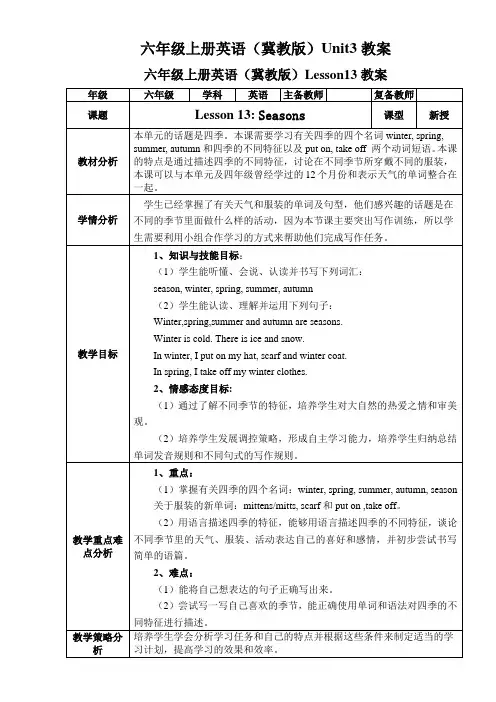
六年级上册英语(冀教版)Unit3教案六年级上册英语(冀教版)Lesson13教案六年级上册英语(冀教版)Lesson14教案Two: New concepts 谈论自己喜欢的季节,练习表达不同天气的词汇,当谈到冬季时,着重练习词组cold andsnowy 。
根据上面的图片,老师用be going to介绍自己在这个季节喜欢做的事情。
然后启发学生自由谈论在某个季节喜欢做的事情。
练习I’mgoing to do。
句式。
Game:每个小组抽取一个季节,在规定的时间内,充分运用I’m going to do。
句式,制定一个小计划。
2.学习put on,take off ,again。
老师再次通过四季,谈论不同季节应该穿什么服装。
老师给学生们展示各种季节的服装实物,让学生选择恰当且喜欢的服装进行搭配,运用I’m going to put on/take off... 进行口头练习。
搭配恰当的同学可以到前面挑选衣服试穿,在试穿的过程中,练习现在进行时Now I’m putting on/taking off。
讲解两种句式的区别,并在学生练习句型的过程中渗透again。
I’m going to put on/take off ...I’m putting on/taking off...I’m hot/cold again.板书again,I’m going to put on/take off myscarf. I’m putting on/taking off my coat.Game:季节转盘。
用ppt制作四个季节的转盘,每个学生可以通过转动,随机确定季节。
当转到某一个季节时,请学生们说说这个季节的天气特征和穿衣习惯,巩固前面所学知识。
3. Let’s do it! 做课本(41页)练习题a. Write and act.b. Find the differences. Then write.4. Listen to the video. And answer thequestions.听课文录音,回答问题。
Unit 3 What can you see
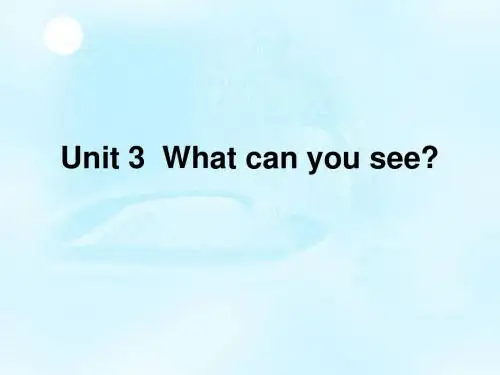
Dialogue1
• Lingling: What can you see?
• Mingming: I can see a river. I can see a lake and a boat.
• Lingling: I can see white clouds and the blue sky.
What can you see in the classroom?
• I can see desks/chairs/books/pens…
What can you see in the pictures?
What can you see in the pictures?
• • • • I can see a dinosaur. I can see a cat. I can see a bird. I can see a dog.
What can you see in the picture?
• I can see the moon.
moon 月亮
What can you see in the picture?
• I can see a star.
star 星星
What can you see in the picture?
Dialogue2
• Lingling: What can you see, Peter?
• Peter: I can see mountag: What can you see Mingming?
• Mingming: I can see a cake.
Let’s Listen and Say
Lingling: What can you see? Mingming: I can see a river. I can see a lake and a boat. Lingling: I can see white clouds and the blue sky. Lingling: What can you see, Peter? Peter: I can see mountains. Lingling: What can you see, Mingming? Mingming: I can see a cake.
冀教版五年级英语上册Unit 3 综合素质达标 附答案
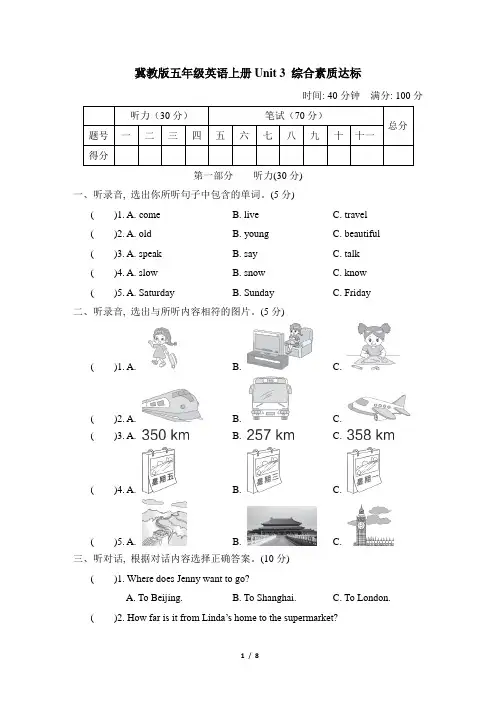
冀教版五年级英语上册Unit 3 综合素质达标时间: 40分钟满分: 100分听力(30分)笔试(70分)总分题号一二三四五六七八九十十一得分第一部分听力(30分)一、听录音, 选出你所听句子中包含的单词。
(5分)()1. A. come B. live C. travel()2. A. old B. young C. beautiful()3. A. speak B. say C. talk()4. A. slow B. snow C. know()5. A. Saturday B. Sunday C. Friday二、听录音, 选出与所听内容相符的图片。
(5分)()1. A. B. C.()2. A. B. C.()3. A. B. C.()4. A. B. C.()5. A. B. C.三、听对话, 根据对话内容选择正确答案。
(10分)()1. Where does Jenny want to go?A. To Beijing.B. To Shanghai.C. To London.()2. How far is it from Linda’s home to the supermarket?A. It’s 2 kilometres.B. It’s 5 kilometres.C. It’s 3 kilometres.()3. What does Lily want to buy?A. Some vegetables.B. Some books.C. Some juice.()4. How will they go to the restaurant?A. By bus.B. By bike.C. On foot.()5. Who will go to Beijing with Li Ming?A. His parents.B. His mother and sister.C. His father and sister.四、听短文, 根据短文内容选择正确答案。
unit3-What-can-you-see
引导学生用I can see…来回答。
2、电脑出示四种交通工具的图片,师生继续巩固上面的句型练习。
B、Learn to say
1、学习对话:
1)出示A部分场景挂图
T:Look, who are they?
Ss: Su Yang and her dad.
T: What are they talking about?
4、教师组织学生开展“快速记忆”游戏,操练新授单词。让四名学生走到讲台前,分别手持一张职业类的如片词卡,在其他同学看了几秒钟之后,让四位学生将图片放在背后,打乱他们的位置,教师用What can you see? 向全班学生提问,学生用I can see …回答。
4、——What can you see?
T: What`s this?
Ss:Bus.
T: What`s this?
Ss:Car.
T: What`s this?
出示火车的单词图片,引导学生学习train。
2、带领学生读准每个单词。在教单词的过程中,教师示范发音,让学生认真听,仔细模仿。
3、以相同方法学习其他单词plane,jeep, boat。
E、Assign homework
(1)听录音,读熟B部分单词。
(2)尝试运用I can see …向家里人表达自己看到的。
(3)鼓励学生平时用所学的日常交际用语相互打招呼。
教学随笔
小学外语备课用笺
课题
Unit3 What can you see?
第2课时
总第8课时
教学目标:
1、能听懂特殊疑问句What can you see?并能根据实际情况用I can see…回答。
二年级下册英语Unit3 What can you see 第2课时牛津译林版
What can you see at the station? I can see a train.
Is this a train? No, it isn’t.
It’s a metro.
red no
What can you see? I can see a metro.
It’s a tram.
What can you see in the lake?
I can see a boat.
row your boat
yellow, snow, window
row (划船)
Row, row, row your boat
Row, row, row your boat, gently down the stream. Merrily, merrily, merrily, life is interesting.
What can you see at the station?
I can seIecaatnrasineaet atheat can you see? I can see a plane in the sky. I can see a boat in the lake. I can see a jeep in the street. I can see a train at the station.
What can you see in the sky?
I caI ncasneesaepelaanpeliannteh.e sky.
What, what, what can you see? I can see a plane in the sky.
What can you see in the lake?
秀英区二小四年级英语下册 Unit 3 What can you see教案 湘少版三起
Unit 3 What can you see?Period 1一、教学目标:1.Words: river, lake, boat, cloud, sky, mountain, sun, moon, star.2.Sentences: What can you see? I can see …二、教学重难点:1.Words and sentences.2.能用所学句型What can you see? 提问别人看到了什么,并能用I can see …描述自己所看到的东西。
三、教学准备:教学磁带,单词卡片等。
四、教学过程:Step 1 Warm upT: We will begin our class now. Children, if you do a good job in class, I’ll give you a price. So let’s come on. OK?[通过给出要求和奖励,提高学生在课上的积极性。
]1.Greetings.2.Free talk: Hello, what’s your name? How are you? What can you do?[通过日常对话营造英语课氛围,并复习已学句型What’s the weather like here ?为新授句型What can you see?做铺垫。
]3.Sing a song: Autumn leaves通过歌曲激发学生兴趣Step 2 Presentation1.Teach the sentences.a. T: What can you see in the classroom?[让学生回答教室中出现的东西,自然引出新授句型What can you see?也易于学生理解。
]2.Teach ‘plane’Show a pictureT:look! What’s this?S:(提示学生)plane通过开火车等小游戏巩固单词3.Teach ‘boat’Show a pictureT: Look, here’s a picture. What can you see in the sky? (plane, kite) What can you see in the river? (duck, boat)[把单词和句型结合在一起操练学习,并为新单词的引出做了铺垫。
2022年人教pep版四年级英语上册Unit 3 第四课时 教学反思
本资源的设计初衷,是为全体学生的共同提高。
作为教师要充分保护好孩子的自信心,只有孩子们有了自信,才有可能持续保持对某些事物的兴趣和热情。
“失败是成功之母”应该改为“成功是成功之母”,特别是在孩子刚开始对某些事物倾注热情和精力的时候,对他们自信心的保护至关重要。
所以强烈建议平时的测验应在学目标范围内尽可能的简单,最大限度的保持孩子的自尊心和自信心。
正所谓“大道至简”,在保证教学目标实现的情况下,教师的课堂要设计的简便扼要,要把较难的、复杂的问题、深刻的问题讲的轻松自然,诙谐幽默,像涓涓细流,于无声中浸润学生的思维。
在单元中,属于承上而启下的教学内容。
Unit 3 第四课时本课时需要重点掌握五个有关爱好的生词:music, science, computer game, sports, painting,其中science,sports的发音稍有难度,学生容易发成/sais/,/sp?:ts/,,要注意及时纠正;He/She/My friend likes ….,这也是本课时的难点之一,尤其是like与likes的区别使用;Let’s do部分要求教师在正确示范的基础上引导学生迅速地作出相应的动作。
第二课时一、教学内容Part A Let’s learn & Let’s do二、教学目标1. 能听、说、认读study,bathroom,bedroom,living room,kitchen等单词并能在日常生活中运用。
’s do部分中的指示语,并能按指令做出相应的动作。
三、教学重难点1.听、说、认读单词:study, bathroom, living room, bedroom, kitchen。
2. 学习表示指令的句型。
四、教学准备录音机、磁带、教学课件、单词卡五、教学过程Step 1 Warming-up1. 复习上节课学过的句型。
2. Free talkT: My home is nice. I have a living room, a bath room, a study and two bedrooms. What about you? Can you tell me about your home?Ss: …Step 2 Presentation1. 学习Let’s learn(1)教师利用挂图呈现一栋房子,并对学生说:Look! This is Amy’’s very big.Wow! There are so many rooms.(2)教师指着bedroom的图片,问学生:What can you see? 当学生回答出bed时,教师说:Yes, it’s a bed. We can have a sleep in the bedroom. (做动作帮助学生理解)This is a bedroom.教读bedroom, 并板书,让学生认读。
- 1、下载文档前请自行甄别文档内容的完整性,平台不提供额外的编辑、内容补充、找答案等附加服务。
- 2、"仅部分预览"的文档,不可在线预览部分如存在完整性等问题,可反馈申请退款(可完整预览的文档不适用该条件!)。
- 3、如文档侵犯您的权益,请联系客服反馈,我们会尽快为您处理(人工客服工作时间:9:00-18:30)。
What can you see, Mingming? I can see a cake! 你能看见什么,明明? 我能看见一块蛋糕。 知识点:What can you see? 你能看见什么? I can see…..我能看见…..
Part B
the sun太阳
the moon月亮
star星星
I can see white clouds and the blue sky.我能看见和蓝色 的天空。 知识点: cloud云 sky天空
What can you see, Peter? I can see mountains. 你能看见什么,彼得? 我能看见山脉。 知识 you ? 你能看见什么?
Part A
What can you see?你能看见什 么? I can see a river. 我能看见一 条河。 I can see a lake and a boat. 我能看见一个湖和一艘小船。 知识点: river河 lake湖 boat船
You’re right, Dino. The town is beautiful! 对,恐龙. 这个城镇很漂亮
Part E
I have a map of my town. The town is near the sea. You can see a river and some mountains, too. There’s a lake near my school. It’s not big, but very beautiful. 我有一张家乡的地图。我的家乡在海边。你也能看见一条河和一 些山。我的学校附近有一个湖,它不大,但很美丽。 知识点:map地图 near在….旁边/附近 there is/are有….
cloud云
sea海
boat船
lake湖
river河
mountain山
Part C
What can you see in the picture? 图片中你能看见什么? I can see the sun and mountains. 我能看见太阳和山。
Part D
Look down, Tim!向下看,蒂姆。It’s nice ,Tim. You can see a town.它很漂亮, 你能看见一个城镇.
